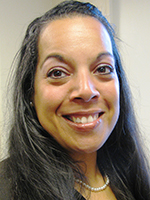-
Services
Featured Specialties
-
Locations
Location Type
-
Patients & Visitors

Lisette Martinez
Describe your role
I see it as an operational, strategic role to introduce diversity and inclusion into everything Yale New Haven Health System does. For example, how do we market the health system's services to the many different people in our communities? How do our employees connect with people who are different from them? When we look for suppliers, are we including women- and minority-owned businesses? It's not about adding another layer; it's about making diversity and inclusion part of what we already do.
What types of diversity do we have throughout YNHHS?
My definition of diversity is 'any difference that makes a difference.' It's not just racial, ethnic, age and gender diversity; it's also about different perspectives. There are a lot of things that make us different, even if we are in the same culture or gender group. By defining diversity more broadly, you get what we call a more "functional definition" – one that is more fluid and applies in all situations.
Why are diversity and awareness efforts so important?
The more we learn about differences in people, the more we break down barriers and build familiarity, comfort and trust. Studies have shown that the more diversity you have in an organization, the better the business results. When people see others who are different from them, they're more curious, they ask more questions and they become more innovative and creative.
How can employees build that familiarity, comfort and trust?
It begins with simply making the effort to reach out to people different from yourself to identify what you have in common. It's the act of cultivating common ground. It's building a relationship with another person. It can be uncomfortable to do and we tend to shy away from these types of interactions. However, when you do reach out and begin talking, you begin building familiarity, comfort and trust. With a little courage and the desire to make the connection, you will be successful.
In terms of diversity and inclusion, what are YNHHS' strengths?
Coming to the east coast from Cincinnati, I'm struck by the amount of diversity here. I want to ensure the health system is investing in the diverse employees we have, by elevating people into leadership roles and having them mentor others who want to advance. Senior leadership's commitment to diversity and inclusion is another major strength here. I love that diversity and inclusion are significant pieces of the new Standards of Professional Behavior that the health system recently adopted.
What are some opportunities for improvement?
Communication is one. Some departments are like close-knit families, but there are others where relationship-building hasn't yet occurred. Leaders have the ability to empower their team members to get to know one another, but it takes time. Leaders must include that expectation for communication and provide opportunities, such as team-building retreats and other activities, that get employees together.
What are future plans for diversity and inclusion in the health system?
There are a number of initiatives being planned or under way. We're building a comprehensive education catalog that includes cultural competency education for every patient-facing employee; working on a diversity and inclusion website and video; and exploring a web portal to make it easier for minority-owned vendors to work with the health system. I would like to create employee resource groups – people who share interests in a certain element of diversity, such as veterans, people with disabilities, LGBT, etc. These groups can help educate and build awareness around that particular type of diversity and assist in areas such as talent acquisition and community engagement.
How can employees support diversity and inclusion in their daily work?
In general, by becoming more self-aware about your own cultural background and learning about others helps build empathy. Appreciating that everyone is different and respecting those differences. Understanding that respecting people's differences does not mean having to change your beliefs. We want you to be who you are while being kind to others. And finally, standing up for one another when we identify an injustice or hear bias remarks. As we work together to learn about one another and protect one another from discrimination, we begin to make a difference here, which will lead us to make a difference in the world.